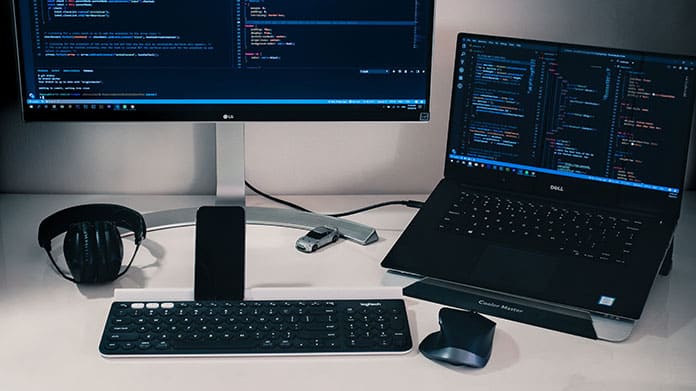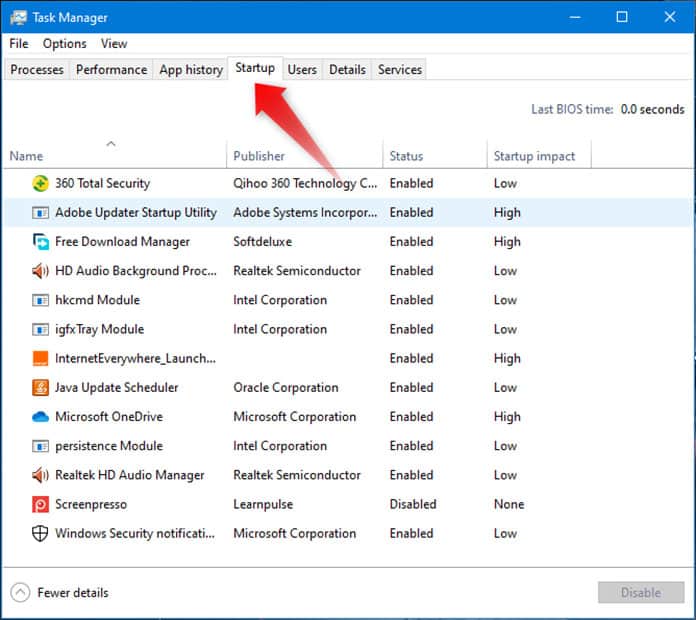Lagging while gaming on a laptop is a major cause of frustration among PC gamers. In most cases, it’s more noticeable when playing graphic-intensive games such as Crysis 3, Batman: Arkham Knight, and Battlefield V.
Lagging is the delay you get when your laptop is unable to produce enough Frames Per Second (FPS) to run games smoothly. Besides low FPS and choppy frame rates, you may also find that your system sometimes freezes or is slow to respond to the input from your keyboard, mouse, or controller.
Laggy gaming laptops result in a poor gaming experience. It is therefore important to understand what causes lagging in order to take the necessary steps to improve gaming performance.
The following are the main things that cause lagging in gaming laptops:
1. CPU And GPU Throttling Due To Overheating
Due to the compact nature of gaming laptops, the Central Processing Unit (CPU) and Graphics Processing Unit (GPU) are crammed into a very small chassis.
This restricts airflow and without a proper cooling mechanism, the heat produced by these components can build up in the interior and reach high levels and cause thermal throttling.
Throttling is a built-in protective mechanism that lowers the processing speed of the CPU or GPU so that it can cool down a bit and not suffer permanent damage. When this happens your laptop’s gaming performance will drop and you’ll notice lagging, stuttering, or screen tears.
You can use software such as MSI Afterburner to find out if your gaming laptop is overheating and then take the necessary measures to cool down your device, such as getting a laptop cooling pad.
| LAPTOP COOLING PAD |
|---|
| Liangstar 6 fan Laptop Cooling Pad |
|
2. Slow Internet Speed For Online Gaming
If you notice your laptop only lags when playing games online on platforms such as Steam, Google Stadia, and Xcloud, the problem could be with your internet speed. Online gaming requires a fast and stable internet connection.
When gaming online, data has to be continuously transferred between your laptop and the server. If you have a poor internet connection, you will experience a delay between when you press a key on your computer and when the server responds (latency).
Therefore, consider checking your Wifi or Ethernet internet speed to eliminate it as a potential problem.
3. Multiple External Devices Connected To Your Laptop

External devices such as monitors, gaming mice, keyboards, and displays can put an additional load on your laptop. They utilize your laptop’s CPU, memory (RAM), and sometimes GPU resources which would otherwise be going into gaming.
How much lag you experience will depend on the number of attached devices as well as the amount of resources they require to operate.
For instance, having a high-resolution external monitor connected will likely introduce more lag than a keyboard or mouse because both the processor and graphics card are forced to work harder to render high-resolution images fast.
4. Too Many Programs Running In The Background
Another thing that is likely to cause lagging is if you have too many programs running in the background. Not only do these programs consume both CPU and memory resources, they sometimes run random scans and updates in the background that can significantly slow down your PC and cause lagging.
Keep in mind that you don’t necessarily have to open a program directly for it to run in the background. Some of these programs automatically run at start-up (when you turn on your laptop).
To view all the programs that run on start-up on Windows, use the keyboard shortcut “Ctrl +Shift+Esc” to open the Task Manager. Under the Start-up tab, you’ll be able to see all the programs that are currently running as well as their CPU and memory usage.

Right-clicking on the processes you want to close gives you the option to disable the program. Also, consider running anti-malware software such as Malwarebytes to scan and remove malicious software that may be slowing down your computer.
5. Gaming Without Plugged In The Charger
Gaming laptops have high-performance processors and dedicated graphics cards that are quite power-hungry. This explains why they’re not able to play games for very long when running on battery compared to regular laptops.
By default, running your laptop on battery switches your laptop to power-saving mode in order to increase battery life. This is bad for gaming because it limits the power supplied to the processor and graphics card.
The CPU and GPU can only reach their full speeds when they have no power restrictions. Therefore, plugging out ultimately causes a drop in overall performance and undesired effects such as lagging.
Keeping your laptop plugged in not only improves performance but also prevents you from getting annoying pop-ups prompting you to connect the charger while you’re in the midst of a game.
6. Failing To Meet The Minimum System Requirements
All software, including games, have different hardware requirements for them to run smoothly on a computer. If your laptop doesn’t meet the minimum system requirements you are likely to experience lagging while gaming.
If you realize that your laptop only lags when you are playing certain games, it is very likely that your hardware is letting you down. You can check the minimum and recommended system requirements for a game by going to systemrequirementslab.com.
If it’s a problem with the OS, RAM, or storage, you can easily upgrade these on a laptop. However, if it is an issue with the CPU or GPU, you might want to consider investing in a new laptop since these components aren’t upgradable on most gaming laptops.
7. Running Outdated Laptop Drivers
Updating drivers, especially those of your graphics card is important to keep games running smoothly on your laptop. Nvidia and AMD constantly release new updates for their graphics card to introduce new features and fix existing bugs.
In addition, keeping the DirectX driver, which helps games to work directly with audio and video software, is important to improve gaming laptop performance and eliminate issues such as lagging.
8. Playing Games At High Settings On A Low-End Laptop
When graphic features such as anti-aliasing, shadows, ambient occlusion, and ray tracing are enabled, the graphics card has to do a lot of rendering and processing.
Therefore, if your laptop’s GPU is not powerful enough, you will experience delays between the time you perform an action, and when you get a reaction on the screen.
This is especially evident if you are gaming on a low-end gaming laptop. High-end laptops with current hardware should not have trouble playing modern games even at high settings.
To minimize lagging on a lower-end laptop, you may have to compromise a bit on the quality of graphics in order to reduce the load on the processor and graphics card. This includes reducing the screen resolution as well as disabling extra features such as ray tracing from the game settings menu.
9. Using The Wrong Graphics Card For Gaming
Gaming laptops have both a dedicated GPU (separate from the CPU) and an integrated GPU (embedded on the CPU). The dedicated GPU is usually more powerful than the integrated GPU since it has its own memory (VRAM).
When playing games, it is recommended that you use the dedicated GPU since it renders images a lot faster. This allows you to get better Frames per Second (FPS) and smoother gameplay without lags or stutters.
To set the dedicated graphics card as the main GPU, you need to go to your Nvidia or AMD GPU control panel and make the necessary adjustments. The following video explains how to switch from integrated graphics card to dedicated graphics card:
10. Having Insufficient RAM
Having enough RAM ensures that all the data and assets your CPU needs when running games or other programs can be accessed and updated fast. If your laptop runs out of RAM, your CPU is forced to fetch data directly from your storage device (SSD or HDD), which is much slower.
This results in a performance drop that can introduce stuttering and lagging. Gaming requires at least 8 GB of RAM. But if you also plan on running other programs (multitasking) while gaming, you might find that even 8 GB is not enough.
Enabling some features such as ray tracing can also demand more RAM. A good example is in the latest release of Call of Duty. Its minimum RAM requirements are 8 GB, but if you wish to enable ray tracing you need 12 GB RAM.
Final Thoughts
Lagging is very frustrating for gamers and identifying the cause is the first step to speeding up your laptop. The factors stated above are the most common reasons why most gaming laptops will lag.
Also note: If your laptop just suddenly started lagging, a recent hardware install, software update, opening a suspicious file, or major configuration settings might be the most likely cause.
